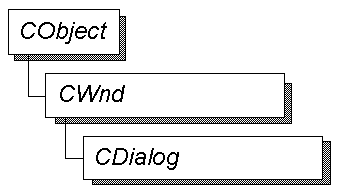class CDialog : public CWnd
 The CDialog class is an abstract class for displaying dialog boxes on the screen. To get a modeless dialog box, you must derive your own class from CDialog. To derive modal dialog boxes, use the CModalDialog class. The constructors for class CDialog are protected, so you must derive your own class.
The CDialog class is an abstract class for displaying dialog boxes on the screen. To get a modeless dialog box, you must derive your own class from CDialog. To derive modal dialog boxes, use the CModalDialog class. The constructors for class CDialog are protected, so you must derive your own class.
A modeless dialog box allows the user to display the dialog box and return to another task without canceling or removing the dialog box. A modal dialog box requires the user to close the dialog box before the application continues.
You can create a modeless dialog in one step or two. To create it in one step, write the constructor so it calls the object's Create member function. To create it in two steps, don't include a call to Create in the constructor. Invoke the constructor for your dialog object, then call the object's Create member function.
A modeless dialog box receives messages from Windows like any other window. To process messages in your derived dialog-box class, provide message-handler member functions for the messages the dialog box can process.
Your message-handler member functions specify what happens when the user works with your dialog box. Typically, you'll override the OnInitDialog member function when you need to initialize controls (such as setting the initial text of an edit box).
You'll also override the OnClose member function of your derived dialog class to call CWnd::DestroyWindow. Instead of calling DestroyWindow, you can call the C++ delete operator on the this reference, which calls DestroyWindow for you.
Your derived dialog-box class can also add member variables to store data entered by the user or data for display to the user. You can add member functions to set or get these values. A modeless dialog box can also send messages to its parent window.
Create your dialog box from a dialog-box resource template, as in traditional Windows. The dialog-box resource specifies a template name or ID, a font to use, a set of controls, such as buttons and edit boxes, and the window styles that apply to the dialog box. To create a dialog box from a template, specify the template in your .RC file and compile it with a resource compiler. The resulting .RES file is sent to the linker, which incorporates the resource information with your executable program. Specify the name or ID of the template when you call the Create member function from your dialog-box constructor.
Instead of creating your dialog box from a compiled resource, you can build the resource yourself in memory, construct an object of your class derived from CDialog, and use the CreateIndirect member function to create the dialog box from the template in memory. The template constructed in memory uses a DLGTEMPLATE data structure, as described in the Windows Software Development Kit documentation.
If the dialog-box template (in a resource file or in memory) specifies the WS_VISIBLE style, the dialog-box window appears in its parent window. Otherwise, you must call the ShowWindow member function, which CDialog inherits from class CWnd.
After the call to Create, Windows sends a WM_INITDIALOG message to the dialog box. You can override the OnInitDialog member function to perform dialog-box initialization chores. For example, if your dialog box displays statistics about the current font, you can override OnInitDialog to set the current values of the static text controls in the dialog box to reflect the statistics.
Although the dialog-box template can specify the dialog-box font, you can also set the font on the fly. If the dialog-box template specifies the DS_SETFONT style, Windows sends a WM_SETFONT message to the dialog box before creating the controls. In response to this message, the application calls the OnSetFont member function. You can override that message-handler function to set the dialog-box font.
When the user terminates a modeless dialog box, call the DestroyWindow member function, which CDialog inherits from class CWnd, to remove the dialog window and destroy its data structures. You can call DestroyWindow from the OnOK, OnCancel, or OnClose member functions, which you can override from class CWnd. If you allocate any memory in the dialog object, override the CDialog destructor to dispose of the allocations.
See Also
CModalDialog
 The CDialog class is an abstract class for displaying dialog boxes on the screen. To get a modeless dialog box, you must derive your own class from CDialog. To derive modal dialog boxes, use the CModalDialog class. The constructors for class CDialog are protected, so you must derive your own class.
The CDialog class is an abstract class for displaying dialog boxes on the screen. To get a modeless dialog box, you must derive your own class from CDialog. To derive modal dialog boxes, use the CModalDialog class. The constructors for class CDialog are protected, so you must derive your own class.